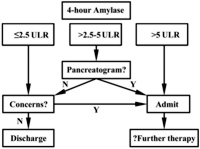Using the 4-hour Post-ERCP Amylase Level to Predict Post-ERCP Pancreatitis
Abstract
Context Post-ERCP pancreatitis is the most common complication of endoscopic retrograde cholangiopancreatography (ERCP). A simple method of predicting patients who are at risk of developing post-ERCP pancreatitis is needed to allow those at low risk to be discharged on the same day of their procedure. The aim of this study was to confirm that 4-hour post-ERCP serum amylase level is predictive of post-ERCP pancreatitis. Patients A study of 886 ERCPs performed at a single centre was conducted. Main outcome measure Four-hour amylase level was recorded, along with patient demographics, procedural details, presence of pancreatogram, and morbidity and mortality. Results Pancreatitis occurred in 4.4% of ERCPs. Hyperamylasaemia was found to be predictive of post-ERCP pancreatitis, with other risk factors being a younger age and pancreatogram. Hyperamylasaemia was also predictive of post-ERCP pancreatitis in the subgroup of patients who had undergone pancreatogram. Conclusions The 4-hour amylase level is a useful measure in the prediction of post-ERCP pancreatitis. Patients who have undergone pancreatogram should be admitted if 4-hour amylase level is greater than 2.5 times the upper limit of reference. Patients who have not undergone pancreatogram should be admitted if 4-hour amylase level is greater than 5 times the upper limit of reference.
Image: Proposed algorithm for selecting patients for same-day discharge post-ERCP.
Downloads
References
McCune WS, Shorb PE, Moscovitz H. Endoscopic cannulation of the ampulla of vater: a preliminary report. Ann Surg 1968; 167:752-6.
Dundee PE, Chin-Lenn L, Syme DB, Thomas PR. Outcomes of ERCP: prospective series from a rural centre. ANZ J Surg 2007; 77:1013-7.
Freeman ML, Nelson DB, Sherman S, Haber GB, Herman ME, Dorsher PJ, et al. Complications of endoscopic biliary sphincterotomy. N Engl J Med 1996; 335 909-8.
Loperfido S, Angelini G, Benedetti G, Chilovi F, Costan F, De Berardinis F, et al. Major early complications from diagnostic and therapeutic ERCP: a prospective multicenter study. Gastrointest Endosc 1998; 48:1-10.
Sultan S, Baillie J. What are the predictors of post-ERCP pancreatitis, and how useful are they? JOP. J Pancreas (Online) 2002; 3 188-94.
Garcia-Cano Lizcano J, Gonzalez Martin JA, Morillas Arino J, Perez Sola A. Complications of endoscopic retrograde cholangiopancreatography. A study in a small ERCP unit. Rev Esp Enferm Dig 2004; 96:163-3.
Ong TZ, Khor JL, Selamat DS, Yeoh KG, Ho KY. Complications of endoscopic retrograde cholangiography in the post-MRCP era: a tertiary center experience. World J Gastroenterol 2005; 11:5209-12.
Tzovaras G, Shukla P, Kow L, Mounkley D, Wilson T, Toouli J. What are the risks of diagnostic and therapeutic endoscopic retrograde cholangiopancreatography? The Australian And New Zealand Journal Of Surgery 2000; 70:778-82.
Vandervoort J, Soetikno RM, Tham TCK, Wong RCK, Ferrari AP, Jr, Montes H, et al. Risk factors for complications after performance of ERCP. Gastrointest Endosc 2002; 56:652-6.
Gottlieb K, Sherman S, Pezzi J, Esber E, Lehman GA. Early recognition of post-ERCP pancreatitis by clinical assessment and serum pancreatic enzymes. Am J Gastroenterol 1996; 91:1553-7.
Christoforidis E, Goulimaris I, Kanellos I, Tsalis K, Demetriades C, Betsis D. Post-ERCP pancreatitis and hyperamylasemia: patient-related and operative risk factors. Endoscopy 2002; 34:286-92.
Ito K, Fujita N, Noda Y, Kobayashi G, Horaguchi J, Takasawa O, et al. Relationship between post-ERCP pancreatitis and the change of serum amylase level after the procedure. World J Gastroenterol 2007; 13:3855-60.
Kapetanos D, Kokozidis G, Kinigopoulou P, Xiarchos P, Antonopoulos Z, Progia E, et al. The value of serum amylase and elastase measurements in the prediction of post-ERCP acute pancreatitis. Hepatogastroenterology 2007; 54:556-60.
LaFerla G, Gordon S, Archibald M, Murray WR. Hyperamylasaemia and acute pancreatitis following endoscopic retrograde cholangiopancreatography. Pancreas 1986; 1:160-3.
Sherman S. Predicting endoscopic sphincterotomy-induced pancreatitis using serum amylase levels. Am J Gastroenterol 1999; 94:1129-30.
Testoni PA, Bagnolo F. Pain at 24 hours associated with amylase levels greater than 5 times the upper normal limit as the most reliable indicator of post-ERCP pancreatitis. Gastrointest Endosc 2001; 53:33-9.
Testoni PA, Bagnolo F, Caporuscio S, Lella F. Serum amylase measured four hours after endoscopic sphincterotomy is a reliable predictor of postprocedure pancreatitis. Am J Gastroenterol 1999; 94:1235-41.
Testoni PA, Caporuscio S, Bagnolo F, Lella F. Twenty-four-hour serum amylase predicting pancreatic reaction after endoscopic sphincterotomy. Endoscopy 1999; 31:131-6.
Thomas PR, Sengupta S. Prediction of pancreatitis following endoscopic retrograde cholangiopancreatography by the 4-h post procedure amylase level. J Gastroenterol Hepatol 2001; 16:923-26.
Cotton PB, Lehman G, Vennes J, Geenen JE, Russell RC, Meyers WC, et al. Endoscopic sphincterotomy complications and their management: an attempt at consensus. Gastrointest Endosc 1991; 37:383-93.
Fletcher RH, Fletcher SW. Clinical Epidemiology: The Essentials (4th ed). Baltimore, MD, USA: Lippincott, Williams and Wilkins, 2005.
Freeman ML, DiSario JA, Nelson DB, Fennerty MB, Lee JG, Bjorkman DJ, et al. Risk factors for post-ERCP pancreatitis: a prospective, multicenter study. Gastrointest Endosc 2001; 54 425-34.
Johnson GK, Geenen JE, Johanson JF, Sherman S, Hogan WJ, Cass O. Evaluation of post-ERCP pancreatitis: potential causes noted during controlled study of differing contrast media. Midwest Pancreaticobiliary Study Group. Gastrointest Endosc 1997; 46:217-22.
Woods KE, Willingham FF. Endoscopic retrograde cholangiopancreatography associated pancreatitis: A 15-year review. World J Gastrointest Endosc 2010; 2:165-78.
Hegewald MJ, Isenberg G, Sterling RK, Cooper GS, Chak A, Sivak MV Jr. Evaluation of a rapid urine amylase test using post-ERCP hyperamylasemia as a model. Am J Gastroenterol 2001; 96:2640-5.
Banks PA, Carr-Locke DL, Slivka A, Van Dam J, Lichtenstein DR, Hughes M. Urinary trypsinogen activation peptides (TAP) are not increased in mild ERCP-induced pancreatitis. Pancreas 1996; 12:294-7.

Copyright (c) 2011 Verity R Sutton, Michael KY Hong, Peter R Thomas

This work is licensed under a Creative Commons Attribution 4.0 International License.
As a member of Publisher International Linking Association, PILA, iMedPub Group’s JOP follows the Creative Commons Attribution License and Scholars Open Access publishing policies. Journal of the Pancreas is the Council Contributor Member of Council of Science Editors (CSE) and following the CSE slogan Education, Ethics, and Evidence for Editors.